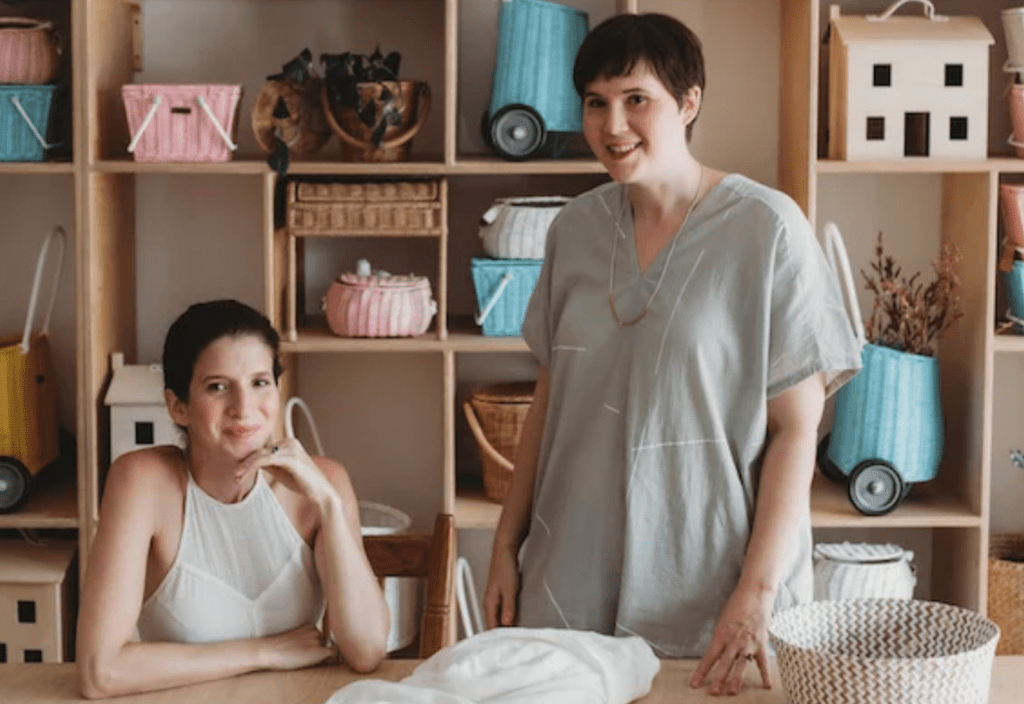There was once a time when it would have been difficult to imagine a workplace where every employee worked when, and from where, they wanted. Where there was no set start and end times to the work day, and where colleagues came together for planning and meetings, but only when needed. Where an employee’s performance was truly assessed on their output, and not by the hours they spent at their desk.
But during the COVID-19 pandemic, and our ongoing experiment with remote work, it’s suddenly become much easier to see how such a workplace could not only work, but thrive. In Byron Bay, lifestyle brand Olli Ella is doing just that.
Founded by sisters Chloe and Olivia Brookman, Olli Ella is known for its modern, folk-inspired children’s products, home decor range and clothing, which are sustainably made. The multimillion-dollar business has offices in London and Los Angeles, as well as its Australian headquarters, and has been on a rapid growth trajectory since it was founded in 2010.
Olli Ella employs more than 30 people across its offices who, since May, have begun self-managing their work days. Employees must be reachable during business hours, but they decide how to manage their workloads and what time of the day they work. The practice applies to everyone in the company except the role of sales assistant at the Olli Ella Byron Bay showroom.
Speaking to our friends at SmartCompany, Olli Ella co-founder and director Chloe Brookman says the company had already been discussing how to adjust the 9-5 work day before the coronavirus pandemic hit, as the traditional notion of what hours employees should work “felt outdated”.
“For the past two years, we have had a 3pm close on Fridays for all staff, and it looked like we would be moving towards a four-day work-week model in the future,” she explains.
“However, when COVID came about we immediately asked all staff to work from home, and in the six weeks that followed, were so encouraged to see how productivity remained high and everyone was flourishing.”
Brookman, her co-founder, Olivia, and Olli Ella’s general manager, Annette Duffield, began discussing why “the traditional work day doesn’t really make sense anymore”.
“Why does our team need to be sitting at a desk five days a week for hours on end? How does this model promote the work-life balance that we all strive to achieve?” Brookman asks.
“The answer is: it doesn’t. So we scrapped it.”
Allowing employees to self-manage their work days and workloads is about giving employees autonomy.
“If team members want to take time out during the day for personal errands and what not, that is absolutely fine,” Brookman explains.
“If team members get their work done and KPIs met and as a result work less hours, that’s also okay.
“We expect our team to be reachable during business hours, and to come into our offices … for meetings and when managers request it, but otherwise they can choose to work from home, or from the office as they please. We are now looking at output as a measurable, rather than hours worked.”

Making it work for Olli Ella
Brookman says the Olli Ella team were “thrilled” when this new way of working was announced, although she suspects some had a clue the week before the announcement was made when everyone was asked to take part in a survey asking them how they felt about working from home, versus working from the office.
Now, several weeks into the new arrangements, Brookman says about half of the company’s employees are choosing to work flexible hours, and “thriving with it being more fluid”, while others are choosing to stick with the structure of a standard work day.
But even then, these employees are tailoring these work days to their own circumstances.
“We’ve loved seeing pretty much all individuals within our team taking time out from their work day to take care of family matters — and in general just living life too — whether it’s going for lunch with friends or going off to exercise,” says Brookman.
Employees are coming together for meetings and planning or collaboration sessions on average once or twice a week, says Brookman, and the customer service team are now operating in shifts to accommodate the change. As for ensuring they had the workplace technologies required to help keep everyone connected, Brookman says the team were already using Microsoft Teams and Sharepoint, “so the transition actually hasn’t been as drastic as one might assume”.
The change has enhanced the culture of the company, says Brookman, who says on a personal level she is “so happy to be able to offer this to my team”. But she’s also aware of how important communication will be to making the arrangement work.
“I think the main thing that will become apparent is that having clear KPIs is essential, and making sure that everyone understands what is expected of them in their roles,” she says.
And does she think more companies will start approaching workplace flexibility in this way?
“I’d like to think that there will be a natural progression to re-look at how we, as businesses, make the workspace more supportive for our workforce, but also understanding that there are limitations depending on the industry that you are in,” says Brookman.
“I just think we should always be looking at how we do things and ask ourselves: can we do better?”
This piece first appeared on Smart Company and is republished here with permission. Read the original here.


